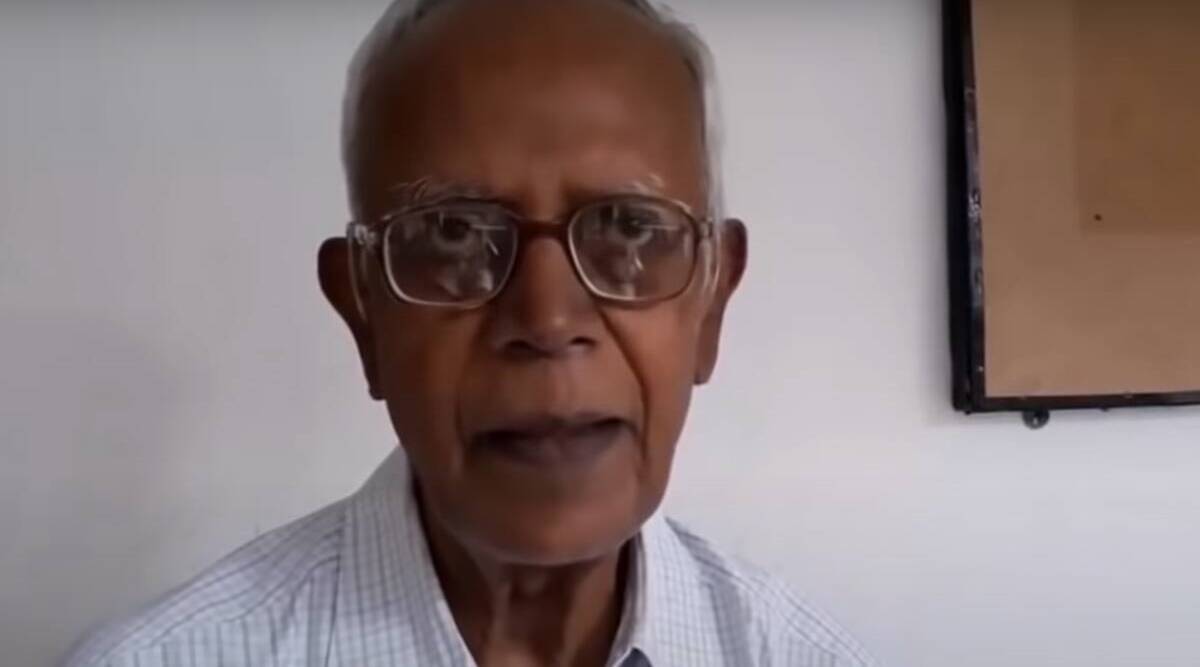 Father Stan Swamy was an 84-year old Jesuit priest and tribal rights activist who was arrested in the Elgar Parishad case. (File)
Father Stan Swamy was an 84-year old Jesuit priest and tribal rights activist who was arrested in the Elgar Parishad case. (File) The Jamshedpur Jesuit Province, to which the Elgaar Parishad case accused Father Stan Swamy was associated, recently sought removal of the “odium” — widespread hatred — attached to Swamy’s name and reputation due to his arrest.
Through written submissions filed before the High Court, Swamy’s lawyers submitted that as per Criminal Procedure Code (CrPC) and Supreme Court rulings, even though Swamy passed away on July 5 pending hearing of his medical bail plea in the court, his next of kin had a right to clear stigma attached to his name.
Submissions were made to a division bench of Justice S S Shinde and Justice N J Jamadar, which has been hearing posthumously the appeals filed by Father Stan Swamy against special court orders rejecting his bail pleas on medical grounds and merits.
The court had kept the pleas pending to ascertain veracity of claims by Swamy’s counsel of “apathy, negligence and lack of medical facilities” given by NIA and state prison authorities, despite the octogenarian suffering from multiple ailments that require close monitoring.
Senior advocate Mihir Desai and advocate Mihir Joshi for Swamy said persons closest to Swamy have as much right to clear his name as he would have had if he still had been alive.
The lawyers said that Jamshedpur Province has appointed Father Frazer Mascerenhas, former principal of St Xavier’s College in Mumbai and currently Parish Priest of St Peter’s Church in Bandra, as delegate and next of kin.
“Article 21 of the Constitution (Right to Life and Personal liberty) equally applies to deceased persons and just as the appellant would have had a right to clear his name if he were alive, similarly those closest to him would have a similar right to clear his name,” Swamy’s lawyers submitted.
Desai said that the National Investigation Agency (NIA) court, which refused bail to Swamy, had made certain observations which “amount to preliminary findings of guilt”, which the High Court should set aside “The substantive bail has been rejected on the basis that the accusations against the accused are prima facie true. So, there is a stigma which attaches to the appellant (Swamy) and will continue to be so attached unless these findings are set aside,” Desai said.
During an earlier hearing, Desai had urged the High Court to exercise its jurisdiction as protector of legal rights of citizens and ask for reports of the magistrate inquiry into Swamy’s “custodial death”.
But the NIA had said the appeals abate after death as per Section 394 of the CrPC (Abatement of appeals on death of accused) and so, such a report need not be submitted to High Court.
Swamy’s lawyers, in response, had said that appeals had been filed as per provisions of the NIA Act and Section 394 of the CrPC was not applicable to them.
Desai further said that assuming Section 394 of the CrPC applied to the present case, even though Swamy was not convicted or sentenced, the Supreme Court rulings provide that the next of kin of deceased appellants had the right to clear odium attached to their names and reputation.
In light of this, Desai sought that appeals continue to be heard posthumously and in case they stand abated, alternatively, the High Court can convert them into writ petitions and grievances be redressed.
The High Court is likely to hear the appeals on August 31.
- The Indian Express website has been rated GREEN for its credibility and trustworthiness by Newsguard, a global service that rates news sources for their journalistic standards.

